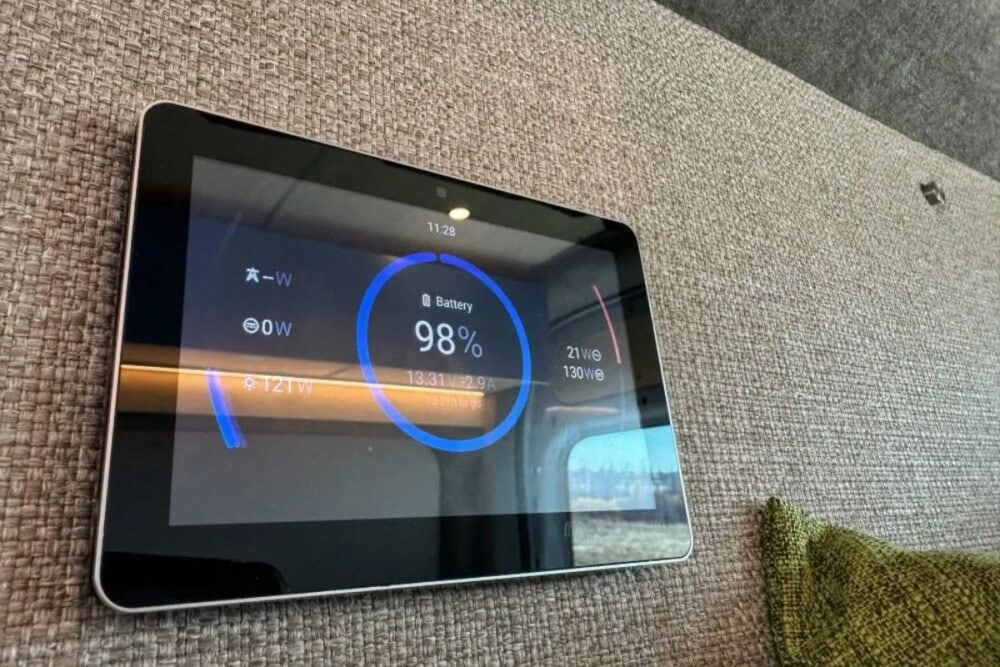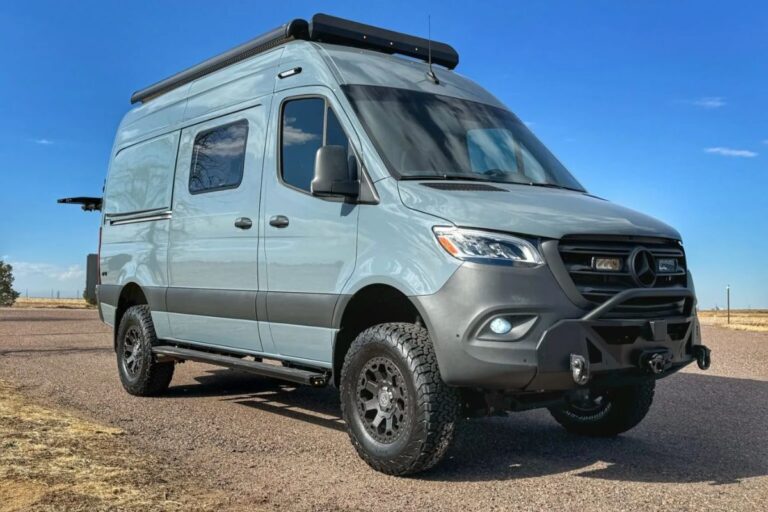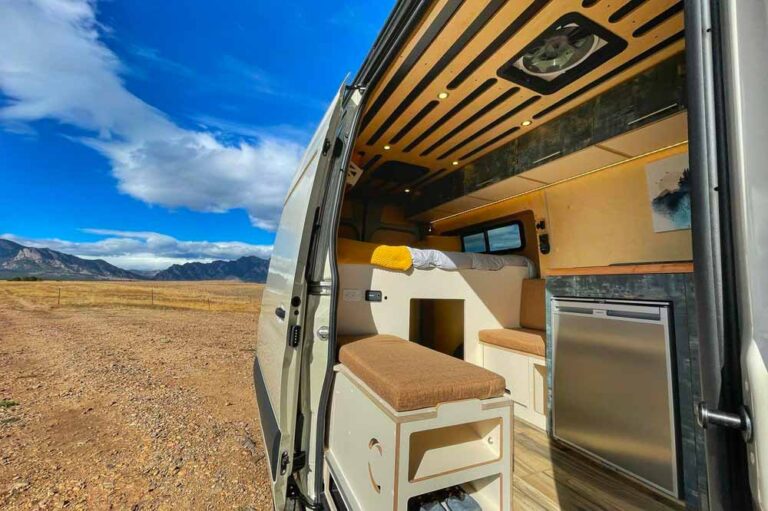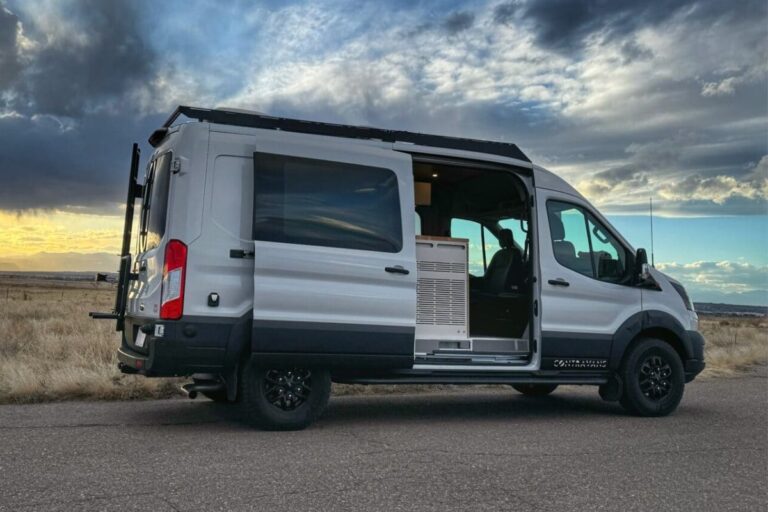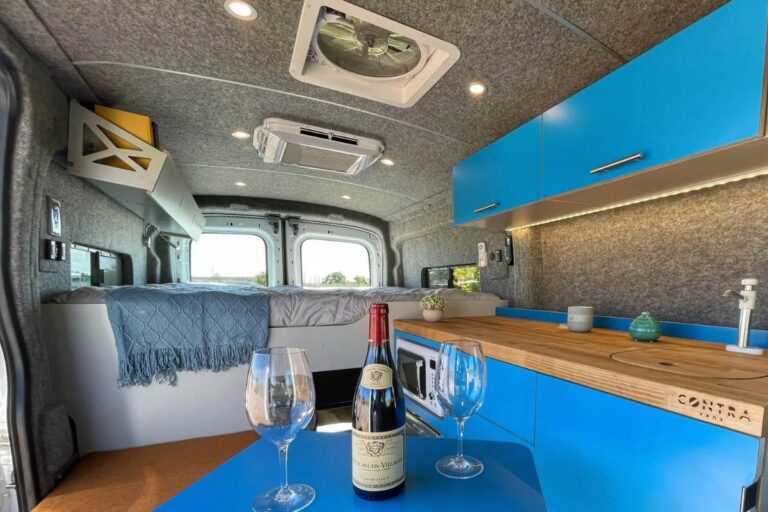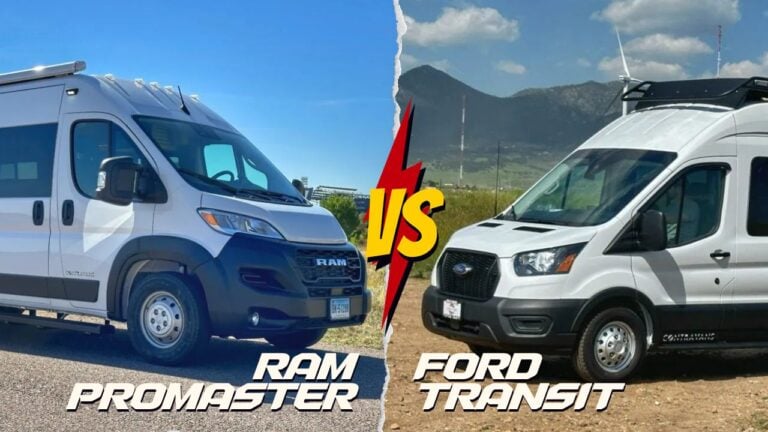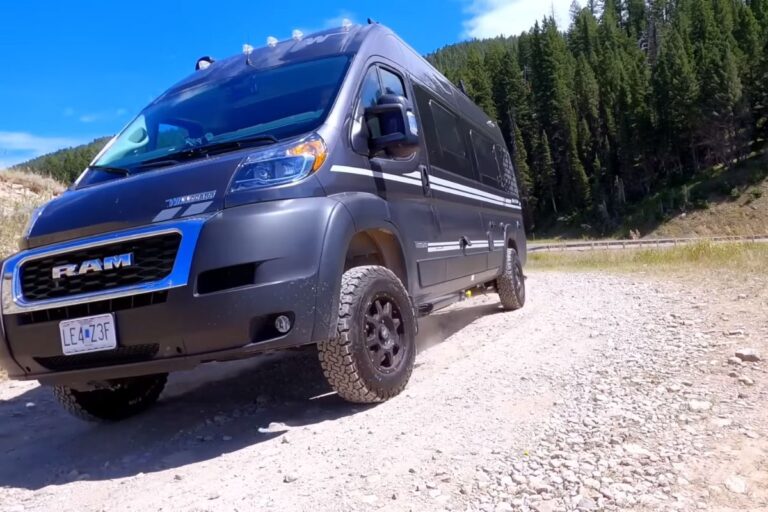Camper Van Electrical System | Options, Prices & Components
LOOKING TO INSTALL A CAMPER VAN ELECTRICAL SYSTEM? HERE IS A RUNDOWN OF YOUR OPTIONS AND HOW MUCH IT WILL COST TO INSTALL IT
If you’re planning to hit the road in a camper van, a solid electrical system isn’t just a nice-to-have, it’s a must. Whether you’re running basic lights and charging your phone or living fully off-grid with a fridge, air conditioning, heating, and Starlink, the right setup makes all the difference.
At Contravans, we’ve spent years helping van lifers power their adventures with reliable, high-quality camper van electrical systems. I’m breaking it all down here: the options you have, the key components, and what it’ll cost to get you up and running.
What Is A Camper Van Electrical System And How Does It Benefit You?
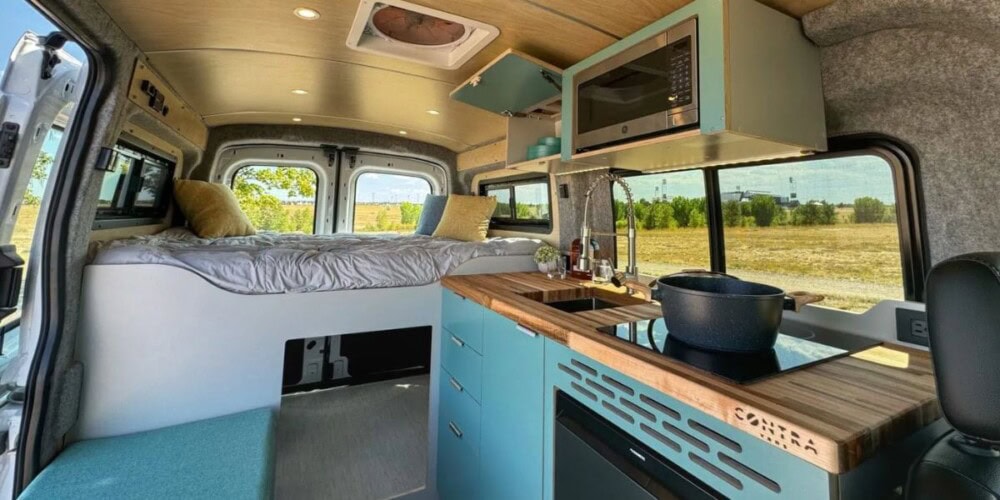
A good electrical system is the backbone of your van life setup. It’s what powers your lights, keeps your food cold in the fridge, charges your devices, and lets you enjoy all the comforts of home while you’re on the road. Think of it as a mini power grid that lets you go off-grid without sacrificing convenience.
So, how does it work? At its core, a camper van electrical system uses batteries to store energy. You can recharge those batteries through solar panels, your van’s alternator while the engine is running, or by plugging into shore power when you’re at a campsite. Once the energy is stored, you can use it to run lights, fans, water pumps, laptops, or even bigger appliances like a microwave or air conditioning unit.
The Benefits of a Good Camper Van Electrical System
- Freedom to Explore: A solid system lets you camp wherever you want, without relying on shore power hookups. Whether you’re deep in the forest or parked on a remote beach, you’ll have everything you need to stay comfortable.
- Convenience: Forget flashlights or dead phone batteries. A good setup powers your devices, lights, and appliances, making life on the road feel like home.
- Savings: With solar power, you reduce the need for campgrounds or fuel-powered generators, saving you money in the long run.
- Flexibility: Whether you need something simple for weekend trips or a robust system for full-time living, there’s an option for everyone.
Camper Van Electrical Systems That We Use
Whether you’re gearing up for weekend getaways or committing to a full-time off-grid lifestyle, you need an electrical system that matches your needs and budget. That’s why we offer two proven options: the Essential Electrical system and the Lifetime Electrical system.
1. Essential Electrical System
If you’re looking for something reliable, affordable, and simple to use, the Essential Electrical System is your go-to. It’s built using Renogy components, a brand we’ve trusted for years. Renogy systems are durable, efficient, and easy to operate, perfect for anyone who wants dependable power without overcomplicating things.
- What You Get: A solid setup that powers every electrical item that we install in your van conversion.
- Warranty: Includes a 2-year warranty for peace of mind.
- Best For: Weekend warriors, shorter trips, or anyone with basic power needs.
One thing to keep in mind, while Renogy systems are great for straightforward applications, they have some limitations. They don’t offer advanced programmability or super-fast charging options, so if you plan to run larger appliances or spend weeks off-grid, you may want to look at our second option.
2. Lifetime Electrical System
For those who want the absolute best, the Lifetime Electrical System is the top-of-the-line option. Built around Victron components, it’s customizable, powerful, and designed for serious off-grid adventures. Victron is the gold standard in camper van electrical systems, trusted for its quality, flexibility, and cutting-edge technology. Of course, given it’s reputation for quality, Victron components come at a higher price!
- What You Get: Fully programmable systems with advanced features, allowing you to run air conditioning, large appliances, and high-demand devices with ease.
- Supercharged Power: Victron systems allow for faster battery charging from the alternator, so you spend less time worrying about power and more time enjoying your trip.
- Warranty: Backed by a 5-year manufacturer warranty.
- Remote Connectivity: If you happen to have a charging issue, we can connect remotely to your system to diagnose the issue.
- Best For: Full-time van lifers, off-grid enthusiasts, and anyone running energy-intensive setups.
Essential Electrical vs. Lifetime Electrical
So how do you choose? It comes down to how you’ll use your camper van electrical system. If you’re serious about van life and want the freedom to stay off-grid for as long as possible, the Lifetime Electrical System is worth every penny. You get maximum performance, unmatched flexibility, and the peace of mind that comes with using the best components on the market.
Lifetime Electrical: Designed for full-time van life or off-grid adventures. If you’re staying off-grid for extended periods of time, running high-demand appliances, staying in remote areas, or want a system that adapts to your needs, Victron is the gold standard.
Essential Electrical: Best for short trips, weekend warriors, or those who need a simple system for lights, charging, and smaller appliances. It’s reliable, more budget-friendly, and is still a quality set up.
Components for Your Off-Grid Camper Van Electrical System
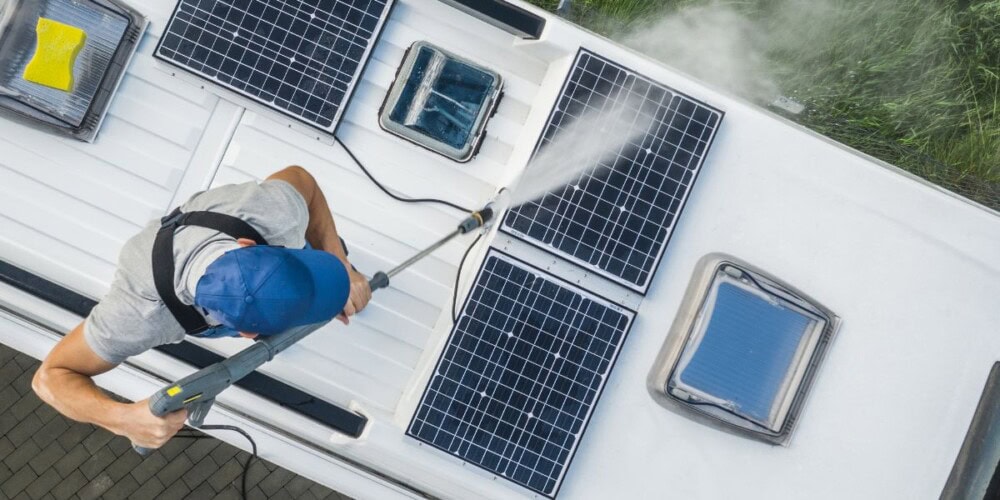
Every camper van electrical system has a few key pieces working together to keep your van powered and your adventures stress-free. Here’s what they do and why they matter:
Batteries
Batteries are the backbone of your camper van electrical system. They store the energy you’ll rely on for everything. If you can swing it, lithium batteries are the best option. They’re lightweight, charge much faster than lead acid batteries, and last far longer than traditional batteries. A good lithium setup means you’ll have reliable power without constantly worrying about recharging or running out of juice.
Solar Panels
Solar panels are like your van’s personal power plant, harnessing free energy from the sun to keep your batteries topped up. Solar power gives you the freedom to stay off-grid longer.
The size and number of solar panels you need depend on your energy use and available roof space. A basic setup with a 100–200 watt panel can handle lights, laptop charging, and is good for off-grid weekends. If you want to boondock for extended periods or you’re running high demand electrical devices, you’ll want a more robust system with multiple higher-output panels.
Inverter
An inverter is what allows you to use standard household devices in your camper van. Your batteries produce DC power (direct current), but most appliances and devices run on AC power (alternating current). An inverter converts DC into AC so you can plug in laptops, kitchen appliances, and anything else with a regular power cord.
There are two main types of inverters:
- Pure sine wave inverters (recommended): These deliver clean, consistent power that’s safe for sensitive electronics like laptops and cameras.
- Modified sine wave inverters: Cheaper, but they can cause issues with certain devices and aren’t as efficient.
Choose the size of your inverter based on what you’ll be powering. For light usage (up to 1 laptop), a 500-watt inverter works fine. For bigger appliances like an induction cooktop or multiple devices at once, go for 2,000–3,000 watts.
Wiring
Wiring might not be glamorous, but it’s critical. It connects all the parts of your electrical system, ensuring power flows safely and efficiently. Using the wrong wire size or poor-quality materials can lead to voltage drops, system inefficiencies, or even dangerous short circuits.
At Contravans, we take wiring seriously. We ensure every wire is properly sized, fused, and insulated for safety and long-term reliability. Cheap wiring might save a few bucks upfront, but trust me, it’s not worth the risk when you’re off-grid.
Pro Tip: Avoid using copper coated aluminum wiring as it will corrode very quickly, especially when used on the outside of the van.
Control Panel and Switches
The control panel is the command center of your electrical system. It gives you a clear, real-time view of your battery levels, solar input, and overall power usage so you know exactly where you stand. It’s the best way to avoid running out of power unexpectedly.
Switches make your life even easier by letting you control lights, fans, and appliances with the flick of a button. Some advanced control panels, like the ones in our Lifetime Electrical Systems, even let you monitor everything via a mobile app, so you can check on your system from anywhere.
What’s the Best Option For You?
Not sure which camper van electrical system fits your needs? Whether you’re planning weekend trips or gearing up for full-time van life, the right setup makes all the difference.
The best way to figure it out? Talk to Kurt from Contravans. He’ll walk you through your options, answer any questions, and help you decide what works for your lifestyle and budget. From system components to pricing, Kurt’s got you covered. Contact us today, and let’s build the perfect camper van electrical system for your next adventure.
For a free consultation about our camper van electrical systems, contact Contravans here.
How Much Does It Cost to Install a Camper Van Electrical System?
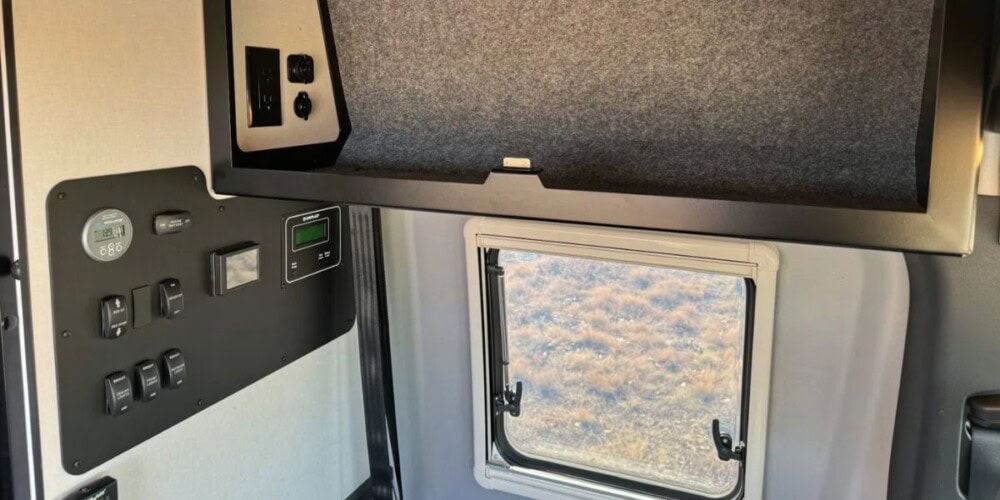
The price of installing a camper van electrical system depends on the setup you choose and the complexity of your van. Here’s a clear breakdown to give you a better idea:
- Essential Electrical System: Will cost around $1,800 for the equipment. This includes Renogy components, one lithium battery, a solar charge controller, and standard wiring for lights, USB ports, and small appliances. It’s a reliable, straightforward system perfect for shorter trips. Installation costs are additional and will vary depending on your van’s layout and existing setup.
- Lifetime Electrical System: Costs around $3,500 for the equipment. This premium system uses Victron components, two lithium batteries for longer power storage, advanced inverters for running larger appliances, and a customizable setup to maximize performance. It also includes options for faster charging, detailed control panels, and monitoring systems. This setup is ideal for full-time van lifers or those who want the flexibility to stay off-grid for extended periods.
These are rough estimates and can vary based on your exact requirements and preferences. Installation pricing depends on factors like your van’s layout, what’s already in place, and the level of customization you need.
The best way to get a detailed quote? Contact Kurt at Contravans. He’ll walk you through your options, explain what each system includes, and help you figure out the perfect solution for your needs and budget.
Frequently Asked Questions
How does the electrical system work on a camper?
A camper van electrical system works by storing energy in batteries. That energy can be recharged in three main ways: through solar panels, from your van’s alternator while the engine is running, or by plugging into shore power at a campsite or home.
Once the energy is stored, it’s distributed to power lights, outlets, and appliances. If you’re using regular household devices, an inverter converts the DC power from the batteries into AC power, so you can plug in and use them seamlessly.
What does a simple camper van electrical system wiring diagram look like?
A basic camper van wiring setup connects key components in a simple flow. The batteries store energy, which is then distributed through a fuse box to operate lights, outlets, and electrical devices. Solar panels feed energy into the batteries through a solar charge controller, and an inverter converts the battery’s DC power into AC power for appliances. Everything is linked together with properly sized wiring for safety and efficiency.
Can I install an electrical system by myself?
Yes, it’s possible to install a camper van electrical system on your own if you’re handy, patient, and have the right tools. However, electrical work requires precision to ensure everything is connected safely and correctly.
Mistakes can lead to inefficiencies, system damage, or even safety hazards like short circuits or fires. For peace of mind and guaranteed reliability, it’s worth having professionals, like us at Contravans, handle the installation.
How much are all of the parts without labor?
The cost of parts depends on the size and complexity of your system. A basic camper van electrical system with AGM batteries, solar panels, a smaller inverter, and necessary wiring typically costs between $1,500 and $2,000. For a more advanced system with lithium batteries, high-output solar panels, and premium components like Victron systems, you’re looking at $3,000 or more.
While you can save on labor with a DIY install, professional installation ensures everything runs smoothly and lasts longer.
What are the benefits of having an off-grid camper van?
An off-grid camper van gives you ultimate freedom and flexibility on the road. You can camp in remote areas without worrying about power hookups or running out of energy.
By relying on solar panels and a good battery setup, you save money by avoiding campgrounds and gas-powered generators. Plus, an off-grid system lets you power fridges, lights, fans, and even air conditioning, so you can enjoy all the comforts of home wherever you park.
What are the best vans to convert?
The best vans for conversion depend on your specific needs, but popular options include the Ford Transit, Mercedes Sprinter, and Ram ProMaster. The Ford Transit is a great all-around choice for its spacious interior and affordability, especially the rugged Transit Trail model. The Mercedes Sprinter is known for reliability and excellent off-road performance, making it ideal for luxury or full-time setups. The Ram ProMaster stands out for its wide, boxy interior, which makes it easier to build out, and it’s more budget-friendly compared to the Sprinter. Choosing the right van comes down to your budget, space requirements, and how you plan to use it.
Final Thoughts: Camper Van Electrical System
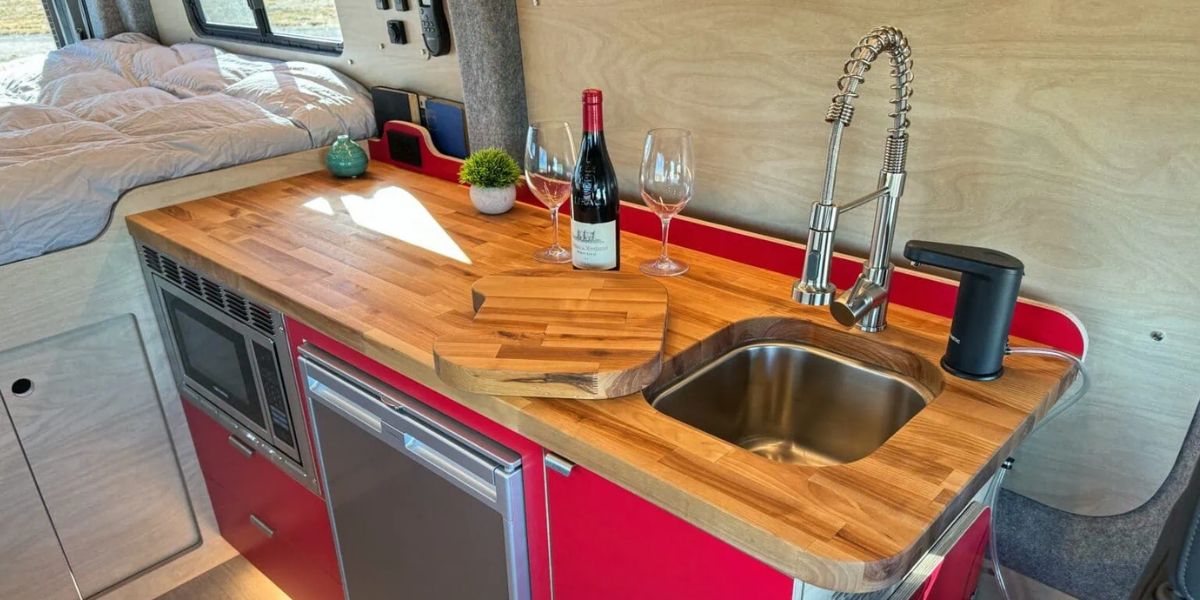
Your camper van electrical system is the key to turning a van into a home on wheels. Whether you need something simple for weekend getaways or a top-of-the-line setup for full-time off-grid living, the right system gives you freedom, comfort, and peace of mind on the road.
At Contravans, we take the guesswork out of the process. With options like our Essential Electrical and Lifetime Electrical systems, we tailor each setup to match your needs, budget, and goals.
If you’re ready to power your next adventure, let’s talk. Contact us today, and let’s build the perfect system to keep you powered wherever life takes you.
YOU MIGHT ALSO BE INTERESTED IN:
Camper Van Builders Colorado | Why Choose Contravans?
Campervan Insulation Guide: What’s the best choice and why?
Promaster vs Transit | Which is the Better Camper Van?

